Cameroon: Crisis causes health-care challenges
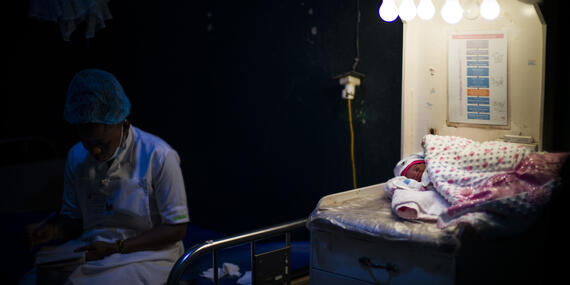
Cameroon’s North-West and South-West Regions are experiencing a severe humanitarian crisis: more than 5800,000 people are internally displaced, and more than 65,000 people have taken refuge in neighbouring Nigeria. The ongoing sociopolitical crisis in both regions led to violence that is affecting the local economy and people’s access to essential social services. Essential services and infrastructure have now collapsed in the most severely affected areas.
More than 210 health facilities are no longer functional because of destruction or abandonment by health personnel.
Internally displaced persons, returnees, and some host populations, especially those in hard-to-reach areas without health facilities, are facing challenges accessing health care. Partners are mobilizing to provide humanitarian assistance to people in need.
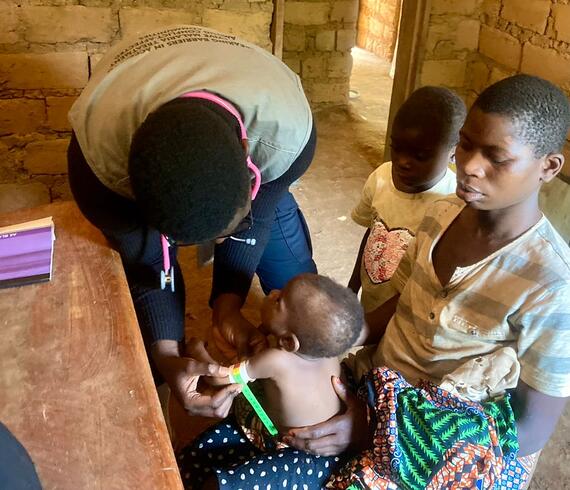
Journey to recovery
In the remote village of Benabinge, North-West Region, where access to basic services is scarce, 2-year-old Ali battled against the devastating effects of malnutrition. His mother and four brothers relied on farming for survival, but the crisis left Ali’s mother struggling to provide adequate nutrition for her children.
Ali was diagnosed with severe acute malnutrition and severe malaria. Recognizing the urgency, a mobile clinic run by humanitarian partners referred Ali to the nearby health centre, which provided him with essential drugs. The mobile clinic team gave Ali ready-to-use therapeutic foods, which played a vital role in his recovery and well-being.
"I am happy humanitarian partners came to Benabinge,” said Ali's mother, expressing her gratitude. "My child would've probably died otherwise, and I would not have been able to do anything about it."
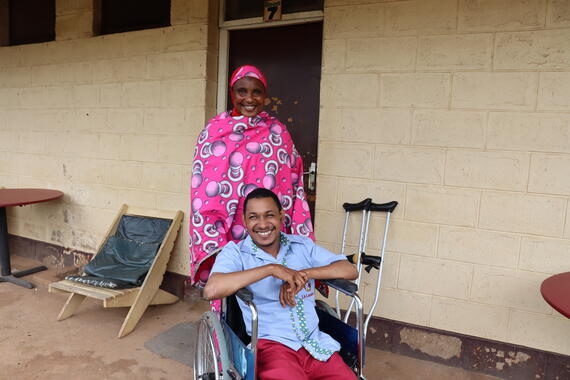
“Since the beginning of the crisis, life has not been the same”, Issa
Ambe, 75, also from Benabinge village, struggled to access health care due to his disability. His nearest health centre was 10 km away and involved a river crossing, so he resorted to traditional medication whenever he fell ill.
Through the mobile clinic, humanitarian partners provided general consultations, tests and treatment for Ambe and other villagers. Ambe received much-needed care for his chronic conditions, which improved his health and gave him a better quality of life.
Issa, 18, is in secondary school in Bamenda, North-West Region. “Since the beginning of the crisis, life has not been the same,” he said.
His mother, Salamtou, struggled to provide for his needs. But he is grateful to her for caring for him all these years.
Issa received a new wheelchair from a humanitarian partner, and he now hopes to become independent, get married and have children.
“This is life-changing for me,” he said.
Through their dedicated efforts and commitment, humanitarian partners helped ensure that remote communities have more equal access to health care.
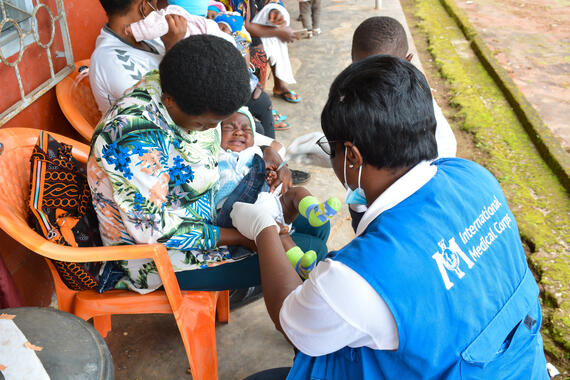
Battling mumps and measles outbreaks
The remote, deserted community of Benagudi, North-West Region, was hit by mumps and measles outbreaks in January 2023. Three-year-old Elizabeth suffered from both of these communicable diseases. Her mother, Rema, spoke with a humanitarian organization that had arrived in the area to provide much-needed health assistance, and Elizabeth received the appropriate treatment.
Between March and April 2023, the measles outbreak affected 13 out of 39 health districts in the North-West and South-West.
Recognizing the urgency of the situation, the Ministry of Public Health launched a mass vaccination campaign with the support of humanitarian partners.
Despite significant logistical hurdles and challenging road conditions, partners transported vaccines in specialized cold-chain boxes. They vaccinated more than 520,000 children in the North-West and South-West regions in 2023, saving lives and safeguarding the communities' health and well-being.
Partners also supported local response activities, such as ring vaccinations and routine immunizations. As a result, no new cases were reported till December 2023.
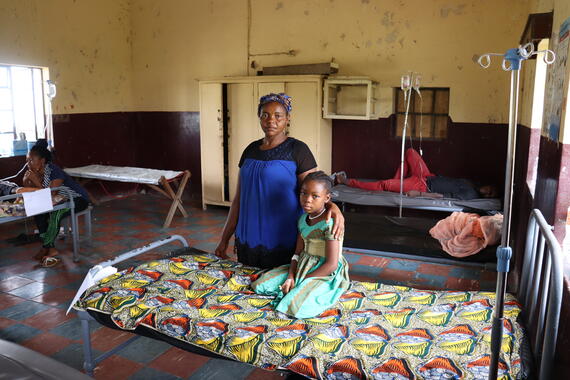
Continuous risk of cholera
A cholera outbreak was declared in the South-West in October 2021. It lasted until September 2022, affecting eight out of ten regions. But the epidemic remains active in the Centre and Littoral Regions; 21,272 cases, including 508 deaths, have been reported as of 28 December. The case fatality rate since the beginning of the epidemic is estimated at 2.4 per cent in the eight Regions affected. Poor access to drinking water and sanitation is a major cause of the outbreak, with population movements facilitating its spread.
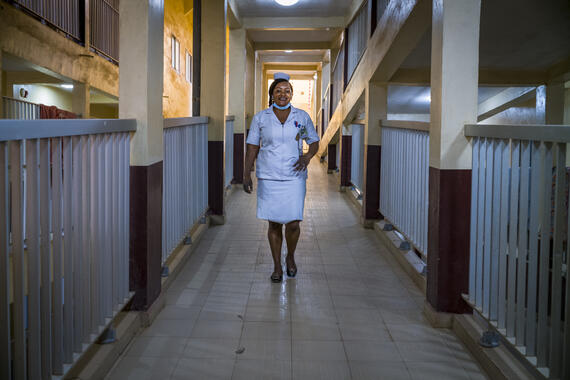
Confronting the first monkeypox case
Cameroon is also affected by monkeypox epidemic. From January to June 2023, the ministry of Health reported 13 cases of monkeypox in the Littoral and South-West regions.
“In 2020, my team and I faced a challenging situation when we diagnosed a confirmed case of monkeypox in the South-West Region,” said Dr. Alain Metuge, who works with Reach Out NGO, a local humanitarian organization operating mobile clinics in the North-West and South-West Regions.
The case involved a 14-year-old internally displaced boy who lived in the bush.
“This discovery prompted our entire team to undergo a 21-day observation period, as directed by the Minister of Public Health,” explained Dr. Metuge. “The experience was a mix of fear and excitement, as we were on the front line of the outbreak. Our early diagnosis played a crucial role in preventing further spread and containing the outbreak. Additionally, we were able to provide effective treatment and care for the boy, who made a full recovery within two weeks.”
In 2023, the mobile clinics provided essential health services to hundreds of thousands of people in the North-West and South-West regions. However, the health assistance coverage remains low due to a lack of services and the high cost of health care. In addition, attacks, violence and the risk of violence against health personnel have considerably limited the deployment of personnel and the availability of technical material and equipment in the North-West and South-West regions.
In 2023, at least 12 incidents of violence against or obstruction of health services were reported North-West and South-West regions. Most of these incidents involved national health workers, including killings, physical assault, abductions, extortion, and threats by parties. Some health infrastructures in these regions have been damaged and medical equipment looted. In the North-West and South-West regions, some health workers have reportedly resigned for fear of reprisals from parties to the crisis.
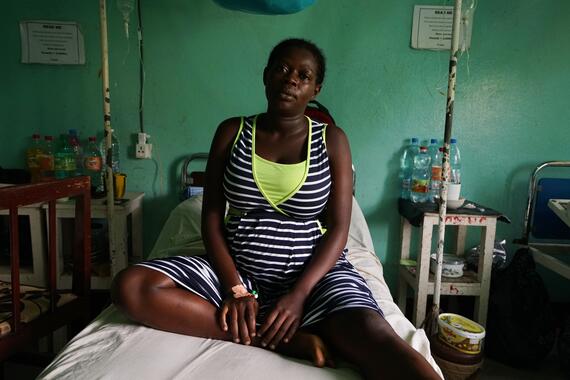
In 2023, humanitarian health partners reached 1.2 million vulnerable people across Cameroon with essential health services. But in 2024, 1.7 million people still need emergency health assistance.
The Health Cluster in the North-West and South-West Regions is led by the World Health Organization, and co-led by Reach Out NGO and Cameroon Baptist Convention Health Services in the North-West Region. The Health Cluster works with other clusters to ensure a cohesive and integrated response in both regions.
In 2023, partners had received 49 per cent of the US$24.9 million requested for health response in Cameroon. A lack of adequate health care and services will have devastating consequences for more than 1 million people, including women, children and people with disabilities.
